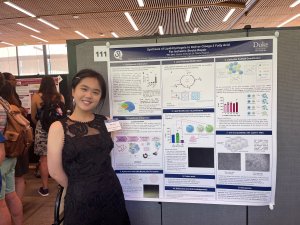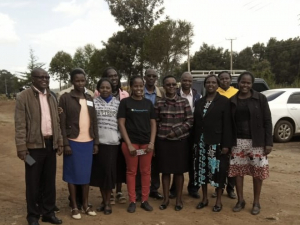Majoring in Neuroscience with minors in Chemistry and Visual & Media Studies and on the pre-med track, Stephany Perez-Sanchez knew she wanted to pursue a career in medicine, all thanks to a high-school psychology course. “My favorite unit in that class was neuroanatomy,” the junior explains. “I was so fascinated by the brain and how this structure controls all our functions.” She brought her cerebral fascination to Duke and began her research in earnest during the summer of 2022 in the Huang Fellows Program. Focusing… read more about Future Physician Discovers Intersections Between Media and Science »
DURHAM, NC – Curiosity paradoxically increases people’s eagerness and patience for an answer, finds a new study by Duke neuroscientists. The research might help teachers and students alike by describing a side of curiosity that encourages us to stay engaged instead of seeking immediate relief. Die-hard fans of the Hulu show, "The Bear" are left on the edge of their seats each Sunday, wondering what's going to happen in the scrappy Chicago hotdog shop next week. But new research from neuroscientists at Duke University… read more about What an Animated Taco Reveals About Curiosity and Patience »
Emma Grisham, Postdoctoral Associate in the Department of Psychology and Neuroscience, is the department’s first-ever “teaching postdoc.” Working alongside Professor of the Practice of Psychology and Neuroscience Bridgette Hard, Grisham is developing expertise in the teaching of psychology. Co-leading the mammoth Introductory to Psychology course (PSY 101), which enrolls close to 700 Duke students a year, as well as the Costanzo Teaching Fellows program, which mentors a cohort of undergraduate students each year to… read more about Meet Emma Grisham, the Department of Psychology and Neuroscience’s First Teaching Postdoc »
Julia Leeman, a double major in Neuroscience and Music, was first drawn to biology and psychology in high school. “I found it interesting to reflect on what others were thinking, but I was also fascinated by the idea of understanding the biological basis,” the senior explains. “I knew that when I went to college, I really wanted to see what neuroscience was all about.” As a first-year student at Duke, Leeman was a part of the FOCUS program, Cognitive Neuroscience and the Law, and learned first-hand what primary research… read more about Listen to This: Neuroscience and Music in Conversation »
Today's student spotlight feature includes a participant in the Summer Neuroscience Program (SNP). SNP is an eight-week program that allows neuroscience majors to get started on their research endeavors. Major Neuroscience Hometown Hefei, Anhui, China Research Area for SNP Stroke repair with biomaterials Highlight of SNP this Summer Independently planned out experiments and… read more about SNP Student Spotlight: Yike Zhu »
Associate Research Professor of Psychology & Neuroscience Maureen Craig joins the Duke faculty this year. (John West/Trinity Communications) As an undergraduate student, Maureen Craig was deeply interested in psychology but didn’t consider the discipline a practical career choice. Pragmatic by nature, Craig instead chose a civil engineering track. But an eye-opening summer internship in the male-dominated field changed her mind. “I had to find a new major,” she said.… read more about Psychologist Maureen Craig Studies How Diversity and Inequality Shape Group Relations »
Hometown Wheeling, WV & Sanford, NC Research Area Neighborhood socioeconomic disadvantage and dementia risk at the Moffitt-Caspi Lab. Our project assesses the social determinants of healthy brain development and aging, focusing specifically on midlife risk for dementia. Why Duke? The people & the school spirit! Duke is full of passionate, unique, and kind-hearted individuals who have helped make me who I am today. The… read more about Student Spotlight: Dev Shah »
Generous funding from the Charles Lafitte Foundation Program in Psychological & Neuroscience Research at Duke University has come full circle, providing positive experiences for families worldwide. Eve Puffer, Pamela and Jack Egan Associate Professor of Psychology & Neuroscience, was awarded a Lafitte Faculty Seed Grant to help foster programs that teach families practices that create healthy, functioning environments for children and their caregivers. In partnership with Duke Global Health Institute (DGHI… read more about It Takes a Village: "Tuko Pamoja" Two-Tiered Approach to Family Intervention »
Is hope everything Disney promises it is? Does hope really have an impact on seemingly unattainable dreams? Through gripping anecdotes and illuminating revelations, our speaker grapples with her views of hope and redefines its meaning in the context of her father’s own battle with a terminal illness. Jothi Gupta is a Robertson scholar and freshman at Duke. She plans to study neuroscience, psychology and journalism. Jothi is a staff writer for The Chronicle focusing on student life… read more about Is Hope Overrated? Jothi Gupta Shares Her Story From the TEDx Stage »
DURHAM, N.C. – A simple shift from a high-pressure mindset to a curious one improves people’s memory. New research from Duke found that people who imagined being a thief scouting a virtual art museum in preparation for a heist were better at remembering the paintings they saw, compared to people who played the same computer game while imagining that they were executing the heist in-the-moment. These subtle differences in motivation — urgent, immediate goal-seeking versus curious exploration for a future goal — have big… read more about This One Simple Brain Hack Might Boost Learning and Improve Mental Health »
Florence Wang graduated this past May with dual degrees in Statistical Science and Neuroscience and minors in Chemistry and Dance. Immersed in STEM throughout her time at Duke, she enhanced her course loads by adding quantitative statistical and life science classes. “That additional coursework really helped me gain a better understanding of the neural mechanisms behind how humans think,” she explains. During her senior year, she added a research assistant position at the Center for Cognitive Neuroscience, where she was… read more about Divergent Thinking by Dint of Dance »
Summer is a great time to catch up on reading. Books from more than a dozen Duke authors offer insight on a range of topics – from gratitude for everyday life to the antislavery writings of Henry David Thoreau. Below is a roundup of some of the most recently published and soon-to-be-out titles. Many of the books, including new editions of previous titles, can be found on the “Duke Authors” display shelves near the circulation desk in Perkins Library. Some are available as e-books for quick download. Most can also be… read more about Hot Off the Press: Summer Reading From Duke Authors »






























